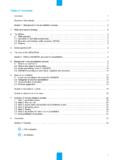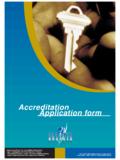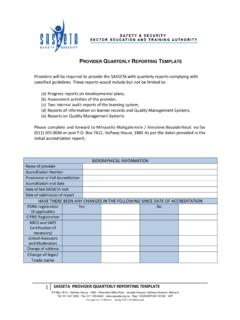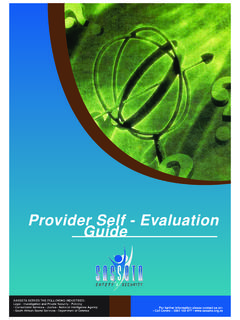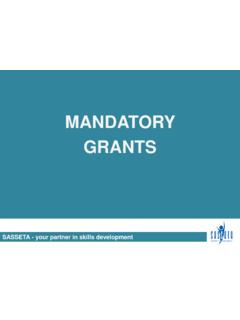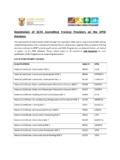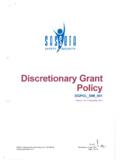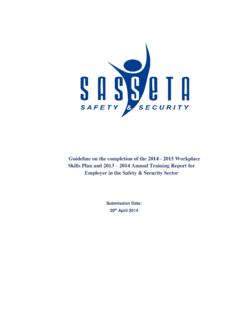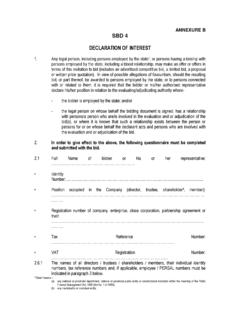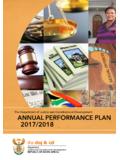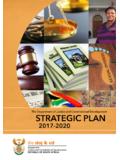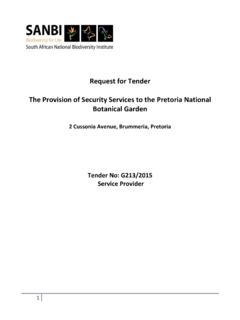Transcription of Guide and application forms for the registration of ...
1 Guide and application forms for the registration of assessors & moderatorsFor further information please contact us on: Tel: 011 805-0084 Fax: 011 805-6630 SERVES THE FOLLOWING INDUSTRIES:Legal Investigation and Private Security Policing Correctional Services Justice National Intelligence Agency South African Secret Services Department of DefenceTable of 1 Purpose of this 2 Section 1: What are assessors and moderators?.. 31. What is an ETDP?.. 32. Important 3 Section 2: Criteria for registration with the 53. Criteria for registration as a sasseta registered 54.
2 Provider Criteria for registration as a sasseta registered 55. Duration of 6 Section 3: Steps in the application process for assessors and 7 Section 4: application 8 Section 5: Code of conduct for assessors and 146. Code of conduct for 147. Code of conduct for 15 APPENDIX UNIT 168. Conduct outcomes-based 169. Design and develop outcomes-based 2010. Conduct moderation of outcomes-based 24iiiAcronymsABETA dult Basic Education and TrainingCAWUC onstruction and Allied Workers UnionCCFOC ritical Cross Field OutcomesCIDBC onstruction Industry Development BoardCOSATUC ongress of South African Trade UnionsCETAC onstruction Industry Sector Education & Training AuthorityDoEDepartment of EducationDoLDepartment of LabourDPWD epartment of Public WorksEEAE mployment Equity ActETDPE ducation and Training Development Practitioner/PracticesETDP SETAE ducation, Training and Development Practices SETAETQAE ducation and Training Quality Assurance BodyFETF urther Education and Training (NQF Levels 2 4)
3 FETCF urther Education and Training CertificatesFETQAF urther Education and Training Quality Assurance BodyGETG eneral Education and Training (ABET, NQF, Lev 1, Std 4)GETCG eneral Education and Training CertificateHEQCH igher Education Qualifications CouncilHETH igher Education and Training (NQF Levels 5 8)M&EMonitoring and EvaluationMOUM emorandum of UnderstandingNLRDN ational Learner Record DatabaseNQFN ational Qualifications FrameworkNSAN ational Skills AuthorityNSBN ational Standard BodiesNSDSN ational Skills Development StrategyNSFN ational Skills FundNTCN ational Technical CertificateOBEO utcomes Based EducationOBETO utcomes Based Education and TrainingPDIP reviously Disadvantaged IndividualPOEP ortfolio of EvidenceSASSETAS afety and Security Sector Education and Training AuthorityQALAQ uality Assurance of Learner AchievementsQMSQ uality Management SystemRPLR ecognition of Prior LearningSADTUS outh African Democratic Teachers UnionSAQAS outh African
4 Qualifications AuthoritySAQAAS outh African Qualifications Authority ActSARSS outh African Revenue ServiceSDAS kills Development ActSDCS kills Development CommitteeSDFS kills Development FacilitatorSDLS kills Development LevySDLAS kills Development Levies ActSDPUS kills Development Planning UnitSDSS kills Development StrategySETAS ector Education and Training AuthoritySGBS tandard Generating BodySIRAP rivate Security Industry Regulatory AuthoritySMES ubject Matter ExpertSMMES mall Medium and Micro EnterprisesSSPS ector Skills PlanWPAW orkplace AssessmentWSPW orkplace Skills PlanThis is a fourth edition June 20061 The Sector Education and Training Authority for: Legal Investigation and Private Security Policing Correctional Services Justice National Intelligence Agency South African Secret Service Department of DefencePurpose of this guideThis Guide has been developed to assist constituent assessors and internal moderators to prepare for and applyfor registration with the sasseta ETQA.
5 The sasseta registers assessors and moderators as part of its qualityassurance role to safeguard learners against prejudice, unfairness and sectionof this Guide provides a brief overview of the roles and responsibilities of assessors 2provides an overview of the criteria that assessors and verifiers/moderators need to have in placein order to be registered with the 3provides an outline of the registration process and the steps that need to be 4provides the application forms for registration for assessors, verifiers and 5outlines the code of conduct for assessors and moderators and should be signed by applicantsand returned to the appendix contains copies of the unit standards referred to in this note that these unit standards will only be registered in February/March 2004 and maybe altered after a process of public comment.
6 Make sure that you keep up to date on the latestversions of the unit standards. These are available on Sector Education and Training Authority for: Legal Investigation and Private Security Policing Correctional Services Justice National Intelligence Agency South African Secret Service Department of DefenceSection 1. What are assessors and moderators?1. What is an ETDP?Assessors and moderators fall into the large group of individuals in South Africa known as Education and TrainingDevelopment Practitioners (ETDP s). This term refers to all the people that play different roles in education andtraining, such as: Teachers; Trainers; Facilitators; Tutors; and person who works full-time as an ETD practitioner should ideally have a full ETD qualification such as an Occupa-tionally-directed ETD qualification ( Diploma in Occupationally-directed Practice at Level 5 on the NQF or aCertificate in Occupationally-directed Practice at Level 4 on the NQF).
7 It may also be possible for the ETD Practitionerto have an equivalent qualification. In addition to such a qualification, full-time ETD practitioners should also bequalified in their ownfield/subject of expertise and be familiar with the work across the sector. The combination of thisand ETD expertise should place such individuals in a position to develop other people in thefield in , not all ETD practitioners are full-time. ETD work is often carried out by individuals who have different jobsas their primary focus, such as being a manager or a supervisor. Nonetheless, such individuals may be in primepositions to conduct certain ETD activities, such as mentoring learners in the workplace or even assessing , many of these individuals may not have a full ETD qualification, but SAQA is in the process of registeringcertain unit standards on the NQF that can act as stand alones for these different roles.
8 For example, it is possibleto formally assess learners if you have the required unit standard in place (along with some other requirements andcriteria discussed later) without having a full ETD may be several instances in which individuals without full ETD qualifications may already havesignificant experience in ETD practices. In such instances, the individuals may wish to be assessed through aRecognition of Prior Learning (RPL) process instead of undertaking a learning programme to achieve thenecessary unit standards. This could be linked to a gap-fill process where the RPL process assists to identifythose specific areas where the learner may require additional ETD roles that are discussed in this document relate specifically to assessment and moderation practices.
9 Thereason for this is that assessors and moderators who plan, conduct or moderate assessments in the sasseta primary focus need to beregisteredwith the Important AssessmentAssessment is the process of gathering and weighing evidence in order to determine whether or not learners candemonstrate outcomes specified in unit standards and/or qualifications registered on the National QualificationsFramework (NQF). Assessors are those individuals who are appropriately qualified to plan and conduct learnerassessments against the requirements of the ModerationModeration is the process that checks that assessments are done according to acceptable standards and is theprocess of ensuring that assessments have been conducted in line with agreed practices so that results are fair, validand Sector Education and Training Authority for.
10 Legal Investigation and Private Security Policing Correctional Services Justice National Intelligence Agency South African Secret Service Department of Provider moderationProvider moderation (which is sometimes referred to as verification) is the responsibility ofproviders. Pro-viders are required to conduct a moderation exercise on learner assessments (or a sample thereof) to ensurethat the assessors involved have been fair, that the results are valid and that the results are reliable ( conducted by different assessors are consistent). Provider moderation can be undertaken by anappropriately qualified employee of the provider, or can be undertaken by external people or organisationsthat are qualified to provide such a service.
